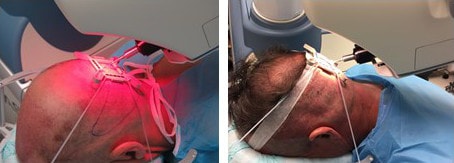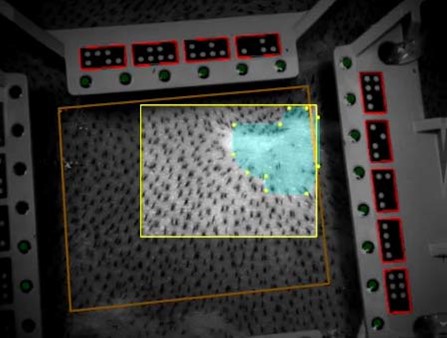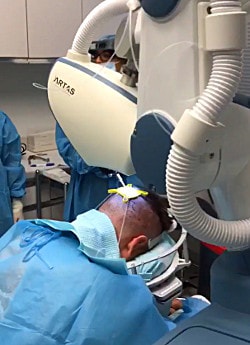In April 2017, Bernstein Medical – Center for Hair Restoration became the first hair restoration practice to perform robotic hair transplant surgery using the new ARTAS Robotic System 9x. ARTAS 9x is a major upgrade of the hair transplant robot, enabling faster and more precise Robotic FUE procedures.
Some of the hardware improvements to the system include a white light LED, color camera and tensioner, 20-gauge harvesting needle, robotic base extender, new needle mechanism cover, and more comfortable headrest and halo. Software upgrades include better scar detection, faster harvesting, ability to zoom into the main viewing screen, and improved ARTAS Hair Studio software.
Color Camera and White LED Light
The original ARTAS robotic system used a black and white optical system and a red LED light. It used a red light source so that blood on the scalp wouldn’t interfere with the ARTAS algorithms. However, clinical staff found that the red light caused eye fatigue over time.
The new optical system uses color cameras and white LED lights so technicians can extract grafts while the system is still harvesting without risk of eye fatigue. The color cameras also allow the robot to associate colors with shapes increasing the visual sharpness and accuracy of the system.
 Previous versions of the robot used a red LED light (left), ARTAS 9x uses a white light (right)
Previous versions of the robot used a red LED light (left), ARTAS 9x uses a white light (right)Assisted Force-Drag
In order for the robot to begin harvesting or site making, it must first align the robotic arm to the grid area defined by a tensioner device. In previous versions of the robot, the robotic arm needed to be manually aligned with the fiducials (indicators) on the top of the tensioner. The new Assisted Force-Drag technology enables the robot to self-align as soon as the fiducials are detected by the optical system. This speeds up the procedure and makes it more efficient by minimizing set-up time between grids.
Robotic Arm Base Extender
Restoration Robotics has modified the robotic arm by adding a base extender in order to achieve a longer reach without increasing the size and weight of the robot itself. The longer reach decreases the need for patient repositioning and chair adjustments and thus decreases the duration of the procedure.
Automatic Scar Detection
 ARTAS 9x detects and blocks harvesting from areas with scarring
ARTAS 9x detects and blocks harvesting from areas with scarringThe ARTAS robotic software can now detect areas with low (or no) hair density and systematically block those areas and that immediately around it from being harvested. The step was done manually in earlier versions. This shortens harvesting time in patients with scarring as it automatically prevents overharvesting in these areas.
Recipient Site Making Blade Holder
Originally, robotic site creation used needles to create recipient sites in the patient’s scalp. However, some physicians prefer to use blades over needles. To address this, Restoration Robotics has developed a blade holder so that surgeons can use either needles or blades. The new blade holder also allows the use of 3rd party blade tips, further enabling the doctor to customize the procedure.
20-Guage Harvesting Needle
The ARTAS 9x robot has the capability of using a very fine 20-guage harvesting needle and punch that permits grafts to be removed though a significantly smaller incision. When appropriate, the use of this needle allows for a harvest with less tissue attached to the grafts. This reduces the need for trimming grafts and speeds up the procedure. It further minimizes the size of the recipient wounds.
Newly Designed Robotic Arm, Headrest, and Halo
The head of the ARTAS robot arm has been reduced in size to increase its mobility and decrease the need for repositioning the patient. This increases patient comfort and shortens the operating time.
An improved site making headrest includes a new, more comfortable pillow with a memory foam layer. The harvesting halo now has rounded edges that allow for secure, faster tensioner placement.
ARTAS Hair Studio
The ARTAS Hair Studio is also improved, now requiring the physician to take just one photo to create the 3D image of the patient’s scalp. With the 9x version of the ARTAS Hair Studio, the surgeon can now zoom in on the user interface screen during recipient site creation and simultaneously examine details and monitor the entire procedure.
Robotic FUE at Bernstein Medical
Bernstein Medical’s Robotic Hair Transplant Center of New York® is among the first facilities in the world to use the ARTAS robot to perform FUE, a procedure pioneered by Dr. Bernstein. Our practice is a beta-test site for this innovative hair restoration technology and Dr. Bernstein is a medical adviser to Restoration Robotics, the company that manufactures the ARTAS robot.






